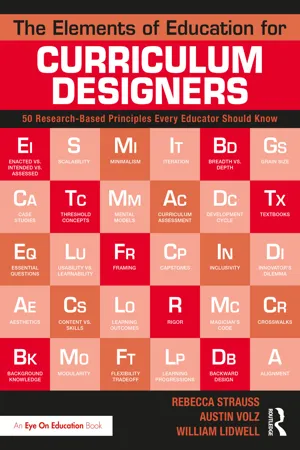
The Elements of Education for Curriculum Designers
50 Research-Based Principles Every Educator Should Know
- 104 pages
- English
- ePUB (mobile friendly)
- Available on iOS & Android
The Elements of Education for Curriculum Designers
50 Research-Based Principles Every Educator Should Know
About This Book
How should curriculum designers translate abstract learning outcomes into engaging learning experiences that get results? What is the right balance between depth and breadth or between content and skills? What methods should be used to continuously improve a curriculum over time? To answer these kinds of questions, the authors combined research from cutting-edge fields with their own first-hand experience to carefully curate fifty essential elements that demystify the work of curriculum design.
Written for utility, clarity, and practical value, this book provides indispensable professional development for educators working in a wide range of fields—from teachers and school leaders to educational publishers and instructional designers. The elements included are applicable across primary, secondary, and higher education as well as for workforce development programs. The Elements of Education for Curriculum Designers is an invaluable resource for anyone aiming to help others learn more effectively.
Frequently asked questions
Information
Table of contents
- Cover
- Half Title
- Series
- Title
- Copyright
- Dedication
- Contents
- Acknowledgments
- Introduction
- 1 Advance Organizers
- 2 Aesthetics
- 3 Alignment
- 4 Background Knowledge
- 5 Backward Design
- 6 Breadth vs. Depth
- 7 Capstones
- 8 Case Studies
- 9 Content vs. Skills
- 10 Course Guides
- 11 Crosswalks
- 12 Curriculum Assessment
- 13 Curriculum Maps
- 14 Curriculum vs. Program
- 15 Development Cycle
- 16 Enacted vs. Intended vs. Assessed
- 17 Essential Questions
- 18 Five Hat Racks
- 19 Flexibility Tradeoff
- 20 Framing
- 21 Grain Size
- 22 Inclusivity
- 23 Innovator’s Dilemma
- 24 Interdisciplinarity
- 25 Iteration
- 26 Labeling Systems
- 27 Learning Objectives
- 28 Learning Outcomes
- 29 Learning Progressions
- 30 Learning Tasks
- 31 Levels
- 32 Magician’s Code
- 33 Mental Models
- 34 Minimalism
- 35 Modularity
- 36 Propositional Density
- 37 Proximity
- 38 Rigor
- 39 Scalability
- 40 Specialization
- 41 Spiral Curriculum
- 42 Stakeholder Assets
- 43 Storytelling
- 44 Student-Facing vs. Teacher-Facing
- 45 Student Work Samples
- 46 Subject-Matter Experts
- 47 Templates
- 48 Textbooks
- 49 Threshold Concepts
- 50 Usability vs. Learnability